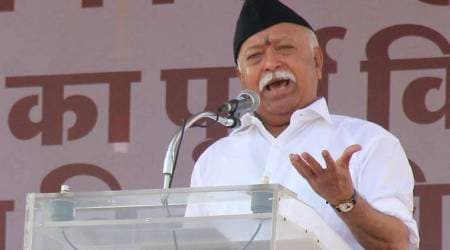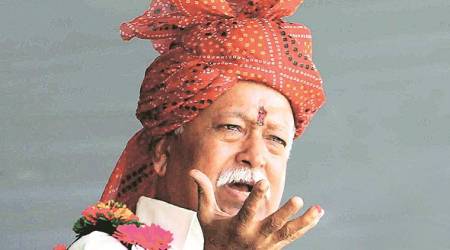 RSS chief Mohan Bhagwat (File Photo)
RSS chief Mohan Bhagwat (File Photo)
Compiled by Liz Mathew
The Organiser takes a critical view of the West Bengal government’s move to cancel permission for a programme which was to be addressed by the RSS chief, Mohan Bhagwat. The editorial warns that the attacks on or the opposition to the RSS, which “works through society, and politics is just part of this national reconstruction mission,” would boomerang. Pointing out that the “nationalist point of view” is on the surge in all the “changing discourses” on critical national issues including those pertaining to Jammu and Kashmir, the Northeast, China, Pakistan, women’s and human rights, the editorial notes that electoral contests are also vindicating such a viewpoint. “The tactical ploy of ‘secular appeasement’ has got us the Partition and separatist mindset. On the contrary, the philosophy of Hindutva is assimilative, as explained by Shri Guruji (Golwakar). RSS works through society and politics is just part of this national reconstruction mission. Without understanding this if political parties try to mindlessly attack the RSS, it will always boomerang,” it notes. The editorial begins with a quote from MS Golwalkar’s Bunch of Thoughts: “There are some who imagine that the concept of Hindu Nation is a challenge to the very existence of the Muslim and the Christian co-citizens and they will be thrown out and exterminated. Nothing could be more absurd or detrimental to our national sentiment. It is an insult to our great and all embracing cultural heritage.”
Islamists in Kerala
The Organiser’s bureau report, “The Usual Suspect”, talks about the radical Islamist organisation, Popular Front of India (PFI), which has deep roots in Kerala. “Although media reports suggest there are at least 22 Keralites who have joined ISIS, NIA suspects the total figure can be more than 80! As per the reports, at least 14 people have already been killed in the war front. Taking all these facts into account, NIA has now decided to probe into 648 missing cases (of which 297 are girls) which have been reported in the last 5 years, between 2012 and 2017,” the report says. It also notes that “Jihadi violence in Kerala is as old as the notorious Moplah riots in 1921, in which thousands of Hindus were brutally massacred.” It says the history of Islamic fundamentalism in the state in the post-Independence period dates back to the formation of the Kerala chapter of Jammat-e-Islami Hind, which held its first meeting in Valanchery in Malappuram on January 30, 1948.
Insecure in Bengaluru
Another article in the Organiser, that talks about the murder of Bengaluru-based journalist Gauri Lankesh, says the incident is a proof that law and order in Karnataka is worsening. Pointing out that the state authorities have failed to arrest anyone for the killing of litterateur M.M. Kalburgi, the report says: “With the same case repeating, that too in a city like Bengaluru, even the common man is now insecure about his security. The people are also demanding that CM Siddaramaiah who has developed a habit of blaming the BJP for every mess should now wake-up.” The article stresses that the BJP leaders have condemned the killing but takes exception to the Congress government’s move to impose restrictions on the BJP’s “Mangaluru Chalo” bike rally for which party had made elaborate
arrangements.
Court on love jihad
An article in the Organiser that gives the “legal perspective” on love jihad says it has “come as a shock to the so-called humanitarians and secularists that even Supreme Court viewed the whole matter with an eye of suspicion.” Pointing out that the court did not focus on the rights of the Kerala girl, Akhila who converted and married a Muslim boy, the writer asks: “…here one question is worth pondering. Which is more important — rights of individual or security of the nation which in turn relates to lives of crores of individuals?” The article says: “The court is not that insane to interfere into the rights of individuals but it clearly stated that due to ‘serious remarks’ by the High Court, a fair enquiry is needed.” The article says: “The so-called humanitarians and the secularist brigades have been criticising the judiciary for not respecting the rights of Akhila. But the court is empowered to interfere in any person’s Fundamental Rights in reasonable capacity for sake of public order and security. In conclusion, it can be said that the judiciary is taking precautions and waiting for a clean report in the case to restore Akhila to her married life. The orders are not the final verdict and the investigation is in the process which is the legal procedure in any case where new allegations and evidence are produced. It would be very narrow to question judiciary on this matter without the final verdict and also myopic to judge the issue of systematic conversions merely as a matter of individual rights.”

